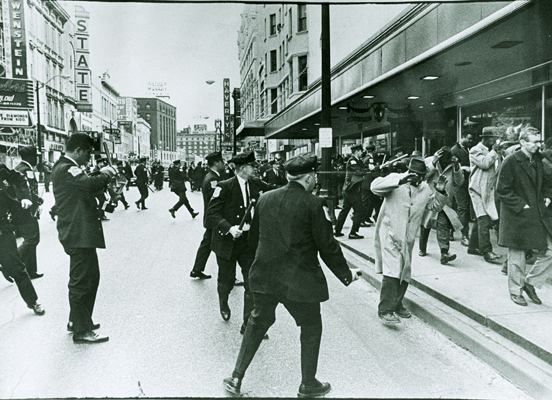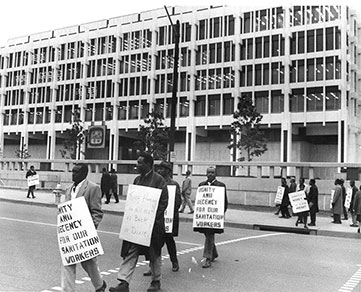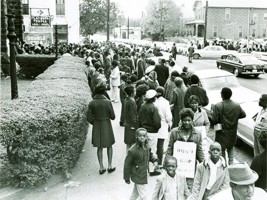1968, The Sanitation Workers and Dr. King
The year 1968 proved to be a turning point for gradualism of integration and racial justice in Memphis. Spurred by the gruesome deaths of two African American sanitation workers, sanitation employees went on strike for higher wages, better working conditions, and union recognition. The strike received national attention and attracted civil rights leaders, including Martin Luther King, Jr., to Memphis. By the late 1960s, King had become more vocal on issues such as the Vietnam War and economic injustice. In 1967, he created the Poor People's Campaign with the goal of achieving economic opportunities and adequate housing conditions for poor Americans -- regardless of color. King's shift in ideology angered some of his supporters. However, local African American leadership in Memphis continued to support King and felt that his presence could help the striking sanitation workers.


On March 28, 1968, King arrived in the city to lead a march through downtown Memphis. The demonstration began peacefully but quickly deteriorated into a violent confrontation as young people at the back of the line of marchers, some taunting the police and chanting "black power," began smashing windows and looting businesses along Beale Street. Police responded by attacking the marchers and the resulting riot left one marcher - sixteen-year-old Larry Payne - dead, sixty-four other people injured, and 300 arrested. Local leaders rushed King from the scene. Determined to lead a peaceful march in Memphis as a prelude to the planned Poor People's March on Washington, D.C., King left the city but vowed to come back to finish what he had started. He returned on April 3, and delivered his famous "I've Been to the Mountaintop" address at Mason Temple. The following afternoon, King was assassinated on the balcony of the Lorraine Motel.
King's death caused a mixed reaction of mourning and rioting across the nation. In Memphis, burning and looting resulted in more than $400,000 in damage to property, but the rioting did not reach the level of destruction in larger cities such as Los Angeles, Chicago, and Detroit. Negotiations continued between the Memphis city government, the sanitation workers, and AFSCME, the union attempting to get recognition to represent the sanitation workers. On April 16, 1968, the strike ended with concessions that included union recognition and higher wages. The strike proved that with unity, patience, and persistence, the Memphis power structure could be forced to change long-held views on race, class, and employment.
After King's assassination, the African American community continued applying pressure on the white establishment. In the summer of 1968, the NAACP created the Ghetto Development Project (GHD) to increase jobs at white-owned businesses in black communities. When these businesses refused to comply with the organization's demands, the GHD led boycotts and pickets at three large shopping districts that were located in predominantly black communities: Bellevue-McLemore, Hollywood-Chelsea, and Lamar-Airways. The protests resulted in a majority of the employers agreeing to hire more African Americans at all level jobs.

A larger showdown occurred the following year, when the NAACP led "Black Monday" boycotts against the Memphis City Schools. In an effort to secure equal representation on the all-white school board, the local NAACP branch sent a list of fifteen demands to the board. When the school board refused to comply, the NAACP asked students to stay away from schools on Mondays. At its height, more than 67,000 students missed classes in predominantly African American schools throughout the city. In solidarity, African American employees skipped work and participated in boycotts, marches, and picketing to support the NAACP's effort. By mid-November, a bi-racial committee negotiated a settlement that called for the creation of two at-large positions on the board. In 1971, Maxine Smith became the first African American elected to the Memphis City Board of Education.
